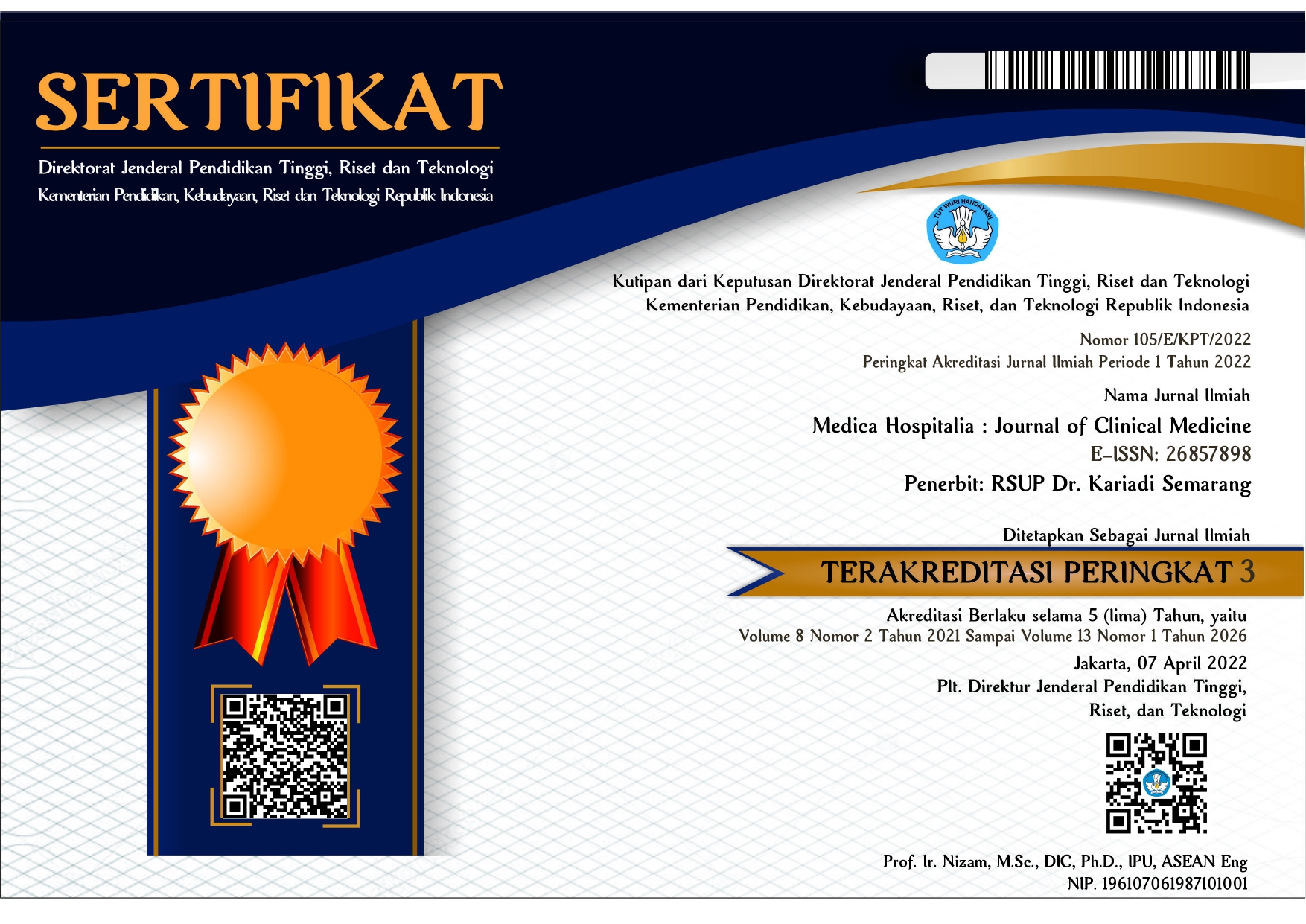Comorbid Factors Affecting the Outcome of Covid 19 in the Intensive Care Unit of Dr. Kariadi Hospital, Semarang
DOI:
https://doi.org/10.36408/mhjcm.v8i3.606Keywords:
covid 19 outcome, coronavirus, predictors of mortalityAbstract
BACKGROUND : Sars-Cov2 has become a pandemic and caused health problems. Several factors that worsen the condition of Covid-19 include age, previous comorbid diseases, secondary infections, and increased inflammatory indicators. There are many studies on the factors that influence the outcome of Covid-19, but the results are inconsistent. Thus, specific research in certain areas is needed so that it can be used in local management.
OBJECTIVE: This study aims to determine the factors that influence the outcome of Covid-19 in the intensive care unit of the Dr. Kariadi Hospital
METHOD : This study analyzed covid 19 patients in the ICU of Dr Kariadi Hospital for the period March-September 2020 with a retrospective method and purposive sampling. The hypothesis test used is adjusted to the measurement scale of each variable. The initial analysis was univariate using chi-square, fisher, t-test, and mann-whitney.
RESULT : From this study, it was found that the factors that influence the covid-19 outcome in a bivariate include a history of heart disease (p = 0.037), temperature (p = 0.012), respiratory rate (p = 0.030), oxygen saturation (p = 0.021), platelets ( p = 0.015), ureum (p = 0.034), PO2 (p = 0.002), oxygen fraction (FiO2) (p = 0.034), AaDO2 (p = 0.004), and PFR (p = 0.001).
CONCLUSION : History of heart disease, temperature, respiratory rate, oxygen saturation, platelets, urea, PO2, required oxygen fraction (FiO2), AaDO2, and PFR were predictors of Covid-19 mortality which were both theoretically and statistically significant.,independent or simultaneously
Downloads
References
Laing, Timothy. 2020. The economic impact of the coronavirus 2019 (Covid-19): Implications for the mining industry. The extractive industries and society. 7: 580-582
WHO. WHO Coronavirus Disease. 2021. Diakses tanggal 18/2/2021 tersedia di https://covid19.who.int/
RM. Situasi Terkini Perkembangan Coronavirus Disease (COVID-19) 18 Februari 2021. Infeksiemerging. 2021. Diakses tanggal 18/2/2021 tersedia di https://infeksiemerging.kemkes.go.id/situasi-infeksi-emerging/situasi-terkini-perkembangan-coronavirus-disease-covid-19-18-februari-2021#
Pemprov Jateng. Statistik Kasus Covid 19 Jawa Tangeh. 2021. Tanggap Covid 19. Diakses tanggal 18/2/2021 tersedia di https://corona.Jatengprov.go.id
Ruan Q, Yang K, Wang W, et al. Clinical Predictors of mortality due to Covid-19 based om an alanlysis of Data 15 Patients from Wuhan China. 2020. Intensive Care Med. 46:846-848 https://doi.org/10.1007/s00134-020-05991-x
Zhou F, Yu T, Du R, et al. 2020. Clinical course and risk factors for mortality of adult inpatients with COVID-19 in Wuhan, China: a retrospective cohort study. Lancet 395: 1054–62
Du R-H, Liang L-R, Yang C-Q, et al. 2020. Predictors of mortality for patients with COVID-19 pneumonia caused by SARS-CoV-2: a prospective cohort study. Eur Respir J. 55: 2000524 [https://doi.org/10.1183/13993003.00524-2020]
Bahl A, Baalen MN, Ortiz L, et al. 2020. Early predictors of in hospital mortality in patients with COVID 19 in a large American cohort. Internal and Emergency Medicine. https://doi.org/10.1007/s11739-020-02509-7
Santus P, Radovanovic D, Saderi L, et al. 2020. Severity of respiratory failure at admission and in-hospital mortality in patients with COVID-19: a
prospective observational multicentre study. BMJ Open;10:e043651. doi:10.1136/bmjopen-2020-043651
Tharakan S, Nomoto K, Miyashita S, Ishikawa K. 2020. Body temperature correlates with mortality in COVID-19 patients.Critical Care. 24:298 https://doi.org/10.1186/s13054-020-03045-8
Carlino MV, Valenti N, Cesaro F, Costanzo A, Cristiano G, et al. 2020. Predictors of Intensive Care Unit admission in patients with coronavirus disease 2019 (COVID-19). Monaldi Archives for Chest Disease. 90:1410. DOI: 10.4081/monaldi.2020.1410
Vivas PF, Doidge J, Thomas K, Gould DW, Mouncey P, et al. Prognostic Factors for 30-Day Mortality in Critically Ill Patients With Coronavirus Disease 2019: An Observational Cohort Study. 2021. The Society of Critical Care Medicine and Wolters Kluwer Health. Vol.49/1. DOI: 10.1097/CCM.0000000000004740
Bao C , Tao X, Cui W, Yi B, Pan T, et al. 2020. SARS-CoV-2 induced thrombocytopenia as an important biomarker significantly correlated with abnormal coagulation function, increased intravascular blood clot risk and mortality in COVID-19 patients. Exp Hematol Oncol 9:16 https://doi.org/10.1186/s40164-020-00172-4
Bonetti G, Manelli F, Patroni A, Bettinardi A, Borrelli G, et al. 2020. Laboratory predictors of death from coronavirus disease 2019 (COVID-19) in the area of Valcamonica, Italy. Clin Chem Lab Med; 58(7): 1100–1105 https://doi.org/10.1515/cclm-2020-0459
Mej?´a F, Medina C, Cornejo E, Morello E, Va´squez S, Alave J, et al. 2020. Oxygen saturation as a predictor of mortality in hospitalized adult patients with COVID-19 in a public hospital in Lima, Peru. PLoS ONE. 15(12): e0244171. https://doi.org/10.1371/journal.pone.0244171
Additional Files
Published
How to Cite
Issue
Section
Citation Check
License
Copyright (c) 2021 Medica Hospitalia : Journal of Clinical Medicine

This work is licensed under a Creative Commons Attribution-ShareAlike 4.0 International License.
Copyrights Notice
Copyrights:
Researchers publishing manuscrips at Medica Hospitalis: Journal of Clinical Medicine agree with regulations as follow:
Copyrights of each article belong to researchers, and it is likewise the patent rights
Researchers admit that Medica Hospitalia: Journal of Clinical Medicine has the right of first publication
Researchers may submit manuscripts separately, manage non exclusive distribution of published manuscripts into other versions (such as: being sent to researchers’ institutional repository, publication in the books, etc), admitting that manuscripts have been firstly published at Medica Hospitalia: Journal of Clinical Medicine
License:
Medica Hospitalia: Journal of Clinical Medicine is disseminated based on provisions of Creative Common Attribution-Share Alike 4.0 Internasional It allows individuals to duplicate and disseminate manuscripts in any formats, to alter, compose and make derivatives of manuscripts for any purpose. You are not allowed to use manuscripts for commercial purposes. You should properly acknowledge, reference links, and state that alterations have been made. You can do so in proper ways, but it does not hint that the licensors support you or your usage.

























